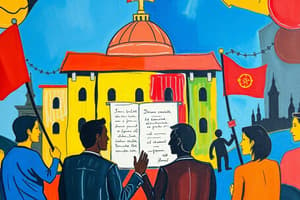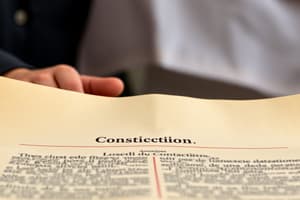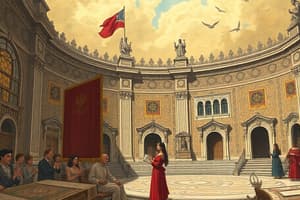Podcast
Questions and Answers
¿Qué implica el Principio de Lealtad Autonómica o Institucional?
¿Qué implica el Principio de Lealtad Autonómica o Institucional?
- Una obligación bilateral de colaborar entre entidades territoriales.
- Un deber unilateral de comportamiento de acuerdo con la buena fe. (correct)
- Un acuerdo formal entre provincias para compartir recursos.
- Una forma de compensar las competencias de los municipios.
¿En qué se basa el Principio de Cooperación entre entes territoriales?
¿En qué se basa el Principio de Cooperación entre entes territoriales?
- En la independencia de cada entidad territorial.
- En el deber de colaboración en el ejercicio de competencias. (correct)
- En la creación de una única administración pública.
- En la competencia entre las entidades para decidir sobre recursos.
¿Cuál es la estructura territorial del Estado según la información dada?
¿Cuál es la estructura territorial del Estado según la información dada?
- Capitales y provincias.
- Departamentos y municipios.
- Municipios, provincias y Comunidades Autónomas. (correct)
- Regiones y Distritos.
¿Cuál de los siguientes derechos no está mencionado entre los principales derechos?
¿Cuál de los siguientes derechos no está mencionado entre los principales derechos?
¿Qué define la provincia según el art. 141.1 de la Constitución?
¿Qué define la provincia según el art. 141.1 de la Constitución?
¿Qué principio asegura que los derechos y libertades reconocidos son vinculantes para los poderes públicos?
¿Qué principio asegura que los derechos y libertades reconocidos son vinculantes para los poderes públicos?
¿Cuál de los siguientes elementos no forma parte de la definición de la provincia?
¿Cuál de los siguientes elementos no forma parte de la definición de la provincia?
¿Qué categoría de administración pública se menciona en el contenido?
¿Qué categoría de administración pública se menciona en el contenido?
¿Cuál de los siguientes derechos hace referencia a la capacidad de organizar reuniones?
¿Cuál de los siguientes derechos hace referencia a la capacidad de organizar reuniones?
¿Cuál es un derecho que protege a los ciudadanos de interferencias en su vida privada?
¿Cuál es un derecho que protege a los ciudadanos de interferencias en su vida privada?
¿Cómo se caracteriza la autonomía de las entidades territoriales?
¿Cómo se caracteriza la autonomía de las entidades territoriales?
¿Qué artículo establece los mecanismos de protección de los derechos y libertades?
¿Qué artículo establece los mecanismos de protección de los derechos y libertades?
¿Cuál es una función principal de la provincia en la organización territorial?
¿Cuál es una función principal de la provincia en la organización territorial?
¿Cuál derecho está relacionado con la capacidad de organizar huelgas?
¿Cuál derecho está relacionado con la capacidad de organizar huelgas?
¿Qué derecho protege la seguridad de las personas?
¿Qué derecho protege la seguridad de las personas?
¿Qué capítulo de la Constitución se centra en los principios rectores de la política social y económica?
¿Qué capítulo de la Constitución se centra en los principios rectores de la política social y económica?
¿Cuál es uno de los protagonistas clave en la concepción pluralista de la sociedad?
¿Cuál es uno de los protagonistas clave en la concepción pluralista de la sociedad?
¿Qué modelo de organización territorial establece la Constitución Española?
¿Qué modelo de organización territorial establece la Constitución Española?
¿Qué principio se considera como el límite a la autonomía en la Constitución Española?
¿Qué principio se considera como el límite a la autonomía en la Constitución Española?
¿Qué significa el principio de Autonomía en el contexto constitucional?
¿Qué significa el principio de Autonomía en el contexto constitucional?
¿Cuál de los siguientes principios NO se incluye en el principio de Solidaridad según la Constitución?
¿Cuál de los siguientes principios NO se incluye en el principio de Solidaridad según la Constitución?
Según la Constitución Española, ¿qué debe hacer el Estado en relación con los desequilibrios interterritoriales?
Según la Constitución Española, ¿qué debe hacer el Estado en relación con los desequilibrios interterritoriales?
¿Qué principio fundamenta el poder del Estado en la Constitución Española?
¿Qué principio fundamenta el poder del Estado en la Constitución Española?
¿Qué implica el principio de Solidaridad entre españoles en el contexto de gestión financiera autonómica?
¿Qué implica el principio de Solidaridad entre españoles en el contexto de gestión financiera autonómica?
¿Qué se consideró necesario tras el cambio de régimen político en 1975?
¿Qué se consideró necesario tras el cambio de régimen político en 1975?
¿Cuál es uno de los valores fundamentales de la Constitución Española de 1978?
¿Cuál es uno de los valores fundamentales de la Constitución Española de 1978?
¿Quiénes son las personas mencionadas en el contenido relacionado con Ingesa?
¿Quiénes son las personas mencionadas en el contenido relacionado con Ingesa?
¿Qué aspecto no se menciona como parte de la protección a la salud en la Constitución?
¿Qué aspecto no se menciona como parte de la protección a la salud en la Constitución?
Qué se establece como base para el nuevo Estado democrático en la Constitución de 1978?
Qué se establece como base para el nuevo Estado democrático en la Constitución de 1978?
La Constitución Española considera la salud como:
La Constitución Española considera la salud como:
¿Qué papel se destaca en la educación respecto a la salud en relación con la Constitución?
¿Qué papel se destaca en la educación respecto a la salud en relación con la Constitución?
¿Qué se entiende por 'principios inspiradores' en la Constitución Española de 1978?
¿Qué se entiende por 'principios inspiradores' en la Constitución Española de 1978?
¿Qué valores superiores se mencionan en el artículo 1.1 de la CE?
¿Qué valores superiores se mencionan en el artículo 1.1 de la CE?
¿Qué significa el concepto 'Imperio de la Ley' en un Estado de Derecho?
¿Qué significa el concepto 'Imperio de la Ley' en un Estado de Derecho?
¿Cuál de las siguientes afirmaciones es incorrecta sobre la función del Consejo General del Poder Judicial (CGPJ)?
¿Cuál de las siguientes afirmaciones es incorrecta sobre la función del Consejo General del Poder Judicial (CGPJ)?
¿Qué aspecto define la separación de poderes en un Estado de Derecho?
¿Qué aspecto define la separación de poderes en un Estado de Derecho?
¿Qué limitaciones tienen los Decretos-leyes dictados por el Gobierno?
¿Qué limitaciones tienen los Decretos-leyes dictados por el Gobierno?
¿Qué garantiza la independencia judicial en un Estado de Derecho?
¿Qué garantiza la independencia judicial en un Estado de Derecho?
¿Cuál de las siguientes características no pertenece al concepto de Estado de Derecho?
¿Cuál de las siguientes características no pertenece al concepto de Estado de Derecho?
¿Cuál de las siguientes es una función del Parlamento en un Estado de Derecho?
¿Cuál de las siguientes es una función del Parlamento en un Estado de Derecho?
Flashcards
Spanish Constitution of 1978
Spanish Constitution of 1978
The 1978 Constitution of Spain marked a pivotal change from a dictatorship to a democratic system.
Values of the Spanish Constitution
Values of the Spanish Constitution
The Constitution outlines the core values and principles that guide the new democratic state.
What is Spain's form of government?
What is Spain's form of government?
The Constitution defines Spain as a 'Social and Democratic State based on the Rule of Law. It values freedom, justice, equality and political pluralism.
Rule of Law
Rule of Law
Signup and view all the flashcards
Separation of Powers
Separation of Powers
Signup and view all the flashcards
Independence of the Judiciary
Independence of the Judiciary
Signup and view all the flashcards
Legal Basis for Public Administration
Legal Basis for Public Administration
Signup and view all the flashcards
Pluralism in Society
Pluralism in Society
Signup and view all the flashcards
Citizen Participation
Citizen Participation
Signup and view all the flashcards
State of Autonomies
State of Autonomies
Signup and view all the flashcards
Principles of the State of Autonomies
Principles of the State of Autonomies
Signup and view all the flashcards
Autonomy of Regions
Autonomy of Regions
Signup and view all the flashcards
Unity of the Spanish State
Unity of the Spanish State
Signup and view all the flashcards
Solidarity Between State and Regions
Solidarity Between State and Regions
Signup and view all the flashcards
Protection of Rights and Freedoms
Protection of Rights and Freedoms
Signup and view all the flashcards
Mechanisms for Rights Protection
Mechanisms for Rights Protection
Signup and view all the flashcards
The Law as a Protector of Rights
The Law as a Protector of Rights
Signup and view all the flashcards
Judicial Control over Rights Enforcement
Judicial Control over Rights Enforcement
Signup and view all the flashcards
Judicial Review
Judicial Review
Signup and view all the flashcards
Types of Rights in the Spanish Constitution
Types of Rights in the Spanish Constitution
Signup and view all the flashcards
Fundamental Rights
Fundamental Rights
Signup and view all the flashcards
Collective Rights
Collective Rights
Signup and view all the flashcards
Non-Discrimination Rights
Non-Discrimination Rights
Signup and view all the flashcards
Political Rights
Political Rights
Signup and view all the flashcards
Rights of Participation
Rights of Participation
Signup and view all the flashcards
Freedom of Expression
Freedom of Expression
Signup and view all the flashcards
Religious Rights
Religious Rights
Signup and view all the flashcards
Cultural Rights
Cultural Rights
Signup and view all the flashcards
Right to a Fair Trial
Right to a Fair Trial
Signup and view all the flashcards
Right to Access Information
Right to Access Information
Signup and view all the flashcards
Study Notes
Constitución Española de 1978
- En 1975, España experimentó un cambio de régimen político, lo que conllevó la creación de una norma suprema: la Constitución Española.
- Esta norma establece los principios y valores que sustentan el nuevo Estado democrático.
- El artículo 1.1 de la Constitución define a España como un "Estado Social y Democrático de Derecho", con valores superiores como la libertad, la justicia, la igualdad y el pluralismo político.
Estado De Derecho
- Se caracteriza por el:
- Imperio de la Ley: La ley representa la voluntad popular, aprobada democráticamente por un Parlamento. El gobierno también puede dictar Decretos-leyes en situaciones de emergencia, pero con límites específicos.
- Separación de Poderes: Las funciones legislativa, ejecutiva y judicial se asignan a poderes independientes. La independencia judicial es crucial para la protección del ciudadano.
- Legalidad en la Administración Pública: La actuación de la administración se rige por la ley.
- Concepción Pluralista: Los partidos políticos, sindicatos y asociaciones empresariales juegan un papel fundamental en la sociedad.
- Participación Ciudadana: El sistema político fomenta la participación, como se indica en el artículo 9.2 y 23.1.
Estado De Las Autonomías
- La Constitución establece un modelo territorial descentralizado y plural: el Estado de las Autonomías
- Los principios fundamentales del sistema (artículo 2) son:
- Autonomía: Capacidad de las regiones para autogobernarse.
- Unidad: La autonomía de las regiones se basa en la unidad del país y está limitada por ella.
- Solidaridad: El Estado y las regiones deben actuar en solidaridad para equilibrar los recursos y oportunidades en todo el territorio.
La Protección de Los Derechos y Libertades
- La Constitución no solo reconoce derechos y libertades, sino que también garantiza su respeto por parte del Estado y los ciudadanos.
- El artículo 53 establece mecanismos de protección, incluyendo:
- La Ley: La ley asegura el cumplimiento de los derechos y libertades.
- El Control Judicial: El poder judicial tiene la función de garantizar el cumplimiento de los derechos y libertades.
Studying That Suits You
Use AI to generate personalized quizzes and flashcards to suit your learning preferences.




